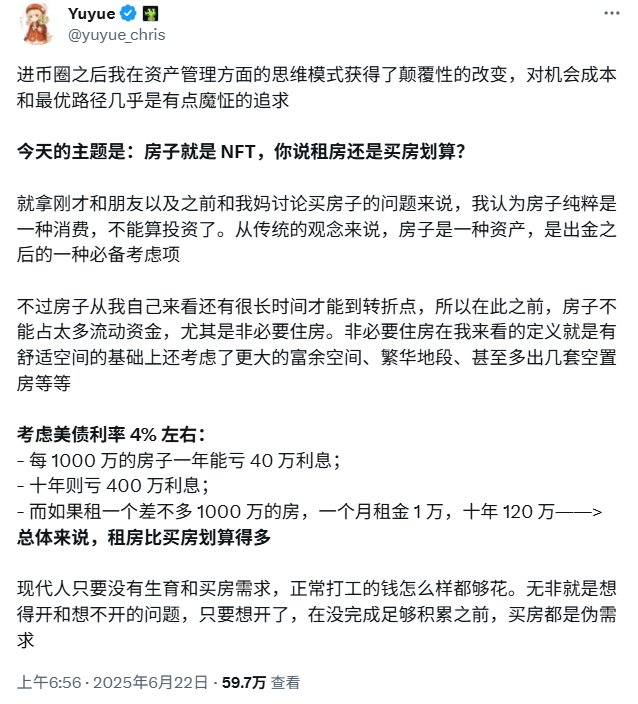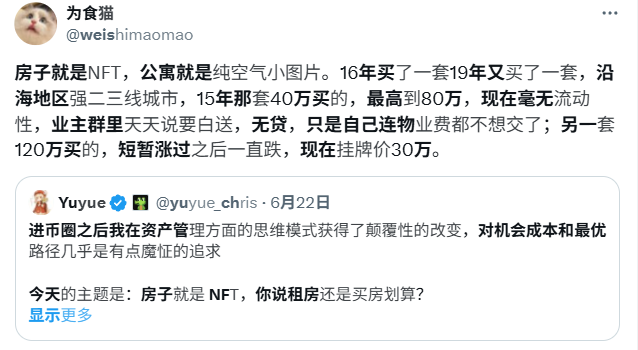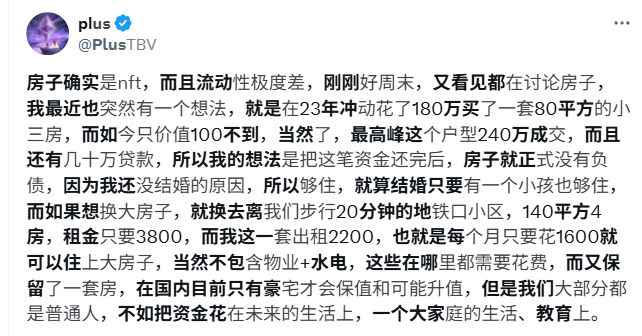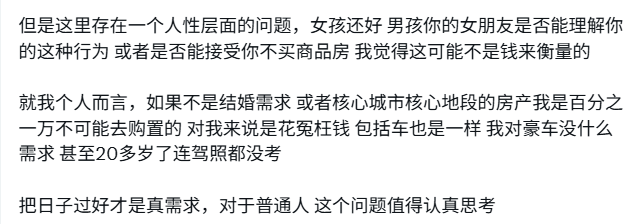Buying a house has always been one of the main life tasks. However, for contemporary people, buying a house has gradually transformed from an absolute main objective to a problem that requires careful consideration.
For those living comfortably, buying a house seems to be something that doesn't require much additional thought. For those still striving, excessively high housing prices have made buying a house seem "not so urgent". For middle-income individuals with housing needs, buying a house is often a life event mixed with happiness and pain. On one hand, obtaining a property deed represents having a truly personal space, with a sense of security that needs no further explanation. On the other hand, in an uncertain housing market environment, buying a house means potentially enduring continuous losses, emptying several wallets to buy a house, only to face potential losses daily. Facing an uncertain future, "Buy or Rent?" has become an enduring social topic.
As a crypto group highly sensitive to asset returns, they also have more aggressive perspectives on heavy assets like real estate. Over the weekend, the Chinese-speaking crypto community generated numerous discussions about buying houses, with various parties offering unique viewpoints.
1. Anti-Buying Group: Housing Returns Are Too Low, Don't Buy!
Yuyue (@yuyue_chris): Currently Buying a House Will Only Face Annual Losses
This discussion originated from X user Yuyue.
Yuyue stated that from an optimal asset planning perspective, currently buying a house (especially non-essential housing) is not a good financial choice. Using the current 4% US Treasury rate as a reference, purchasing a 10 million house would lose 400,000 in interest annually, and renting the same house would be much more cost-effective. Buying a house now can only be considered consumption, not an investment.

0xTodd (@0x_Todd): Buying a House Is Like Long with 2-4x Leverage
"Buying a 10 million house, where the actual construction cost is not over 10%, with the remaining 90% being option fees for a bullish outlook. Moreover, with a rent-to-sale ratio of 2.5%, you're effectively losing 2.5% annually, which is 250,000 RMB in interest, not even accounting for additional inflation from RMB printing. If it's a loan, the lost interest would be even more."
"If you buy a 100 sq meter house for 10 million, in the same location, someone else could rent a 200 sq meter house with the interest from 10 million. While owning might feel better, the latter option is larger. Or if they rent a 100 sq meter house, the extra 250,000 could be spent on various experiences, creating more memories. So, buying a house is essentially long with 2x-4x leverage facing fees."
More Homeowners Share Their Experiences:
X users @weishimaomao and @PlusTBV described their experiences of "massive housing losses", suggesting that money would be better spent on personal life rather than expensive property.


2. Pro-Buying Group: Owning a House Has Unique Emotional and Asset Value, Worth It!
Ice Frog (@Ice_Frog666666): If Conditions Allow, Buying a House Can Accumulate Many Emotional Memories
"Besides improving family living quality, a house can carry and record beautiful memories, especially if it's a suburban villa with a large yard."
"Particularly when there are children, this house might represent their entire childhood, a place for all their happy moments, like an invisible family photo album."
"The warm memories and emotional accumulation a house carries across time might be a true form of 'inheritance'."
Various perspectives continue discussing the pros and cons of home ownership from financial, emotional, and personal perspectives.
BY(@By_Web3): Housing Demand Also Involves Human Nature Issues
For ordinary people, buying a house is not just an economic issue, but also includes life needs such as marriage.

TingHu(@TingHu888): Investment Still Needs to Consider Human Nature, Holding Real Estate is More Stable Than All In Investment
"Actually, it's very simple. When the proportion of houses in total assets is not high, you won't consider such cost-effectiveness.
Many people who sell their houses or mortgage them for investment end up 99.9% tragically, while those who cash out to buy houses, although experiencing pullbacks, at least preserve most of their profits.
Investment is not just about profit and loss cost-effectiveness, but also about considering the negative effects of human nature. Without controlling excessive greed, being conservative is still the best approach."
Whether to buy a house is actually a very personal matter.
From the discussion, everyone is using facts to prove the correctness of their own perspectives. Looking beyond a single perspective, "low property returns" and "having a house is happiness" are actually not contradictory. The reason many people are not interested in buying houses may not be simply because the asset is "not excellent enough", but more because housing prices are too high and economic expectations are poor.
As a living necessity, houses can be bought or rented based on personal circumstances or concepts. If economic capacity is sufficient, purchasing property as a consumer good without considering returns is understandable; if economic capacity is limited, renting instead of buying to relieve life pressure is the right thing to do in the right environment.
However, neither "determined to buy a house" nor "determined not to buy a house" should become a form of political correctness.








